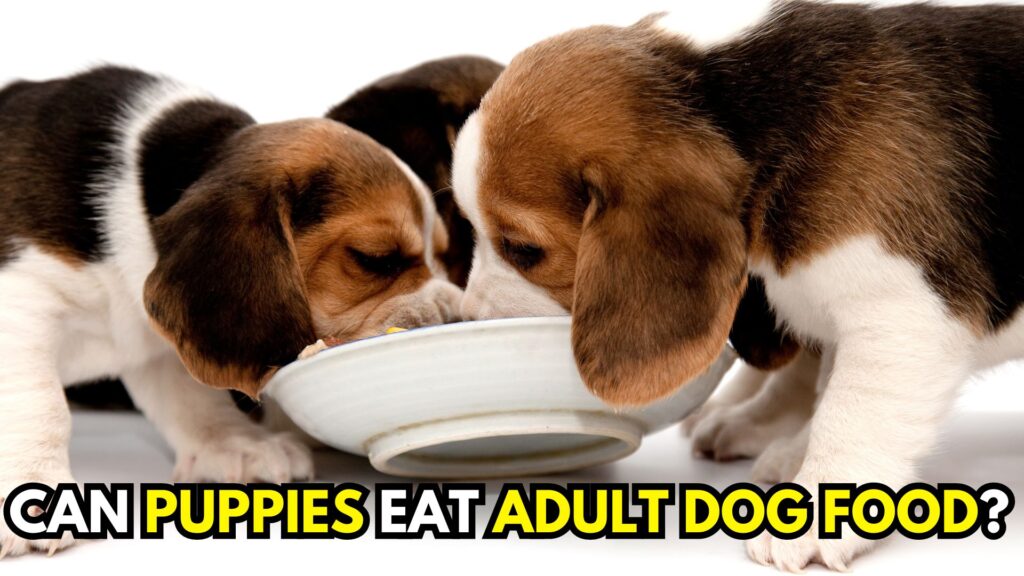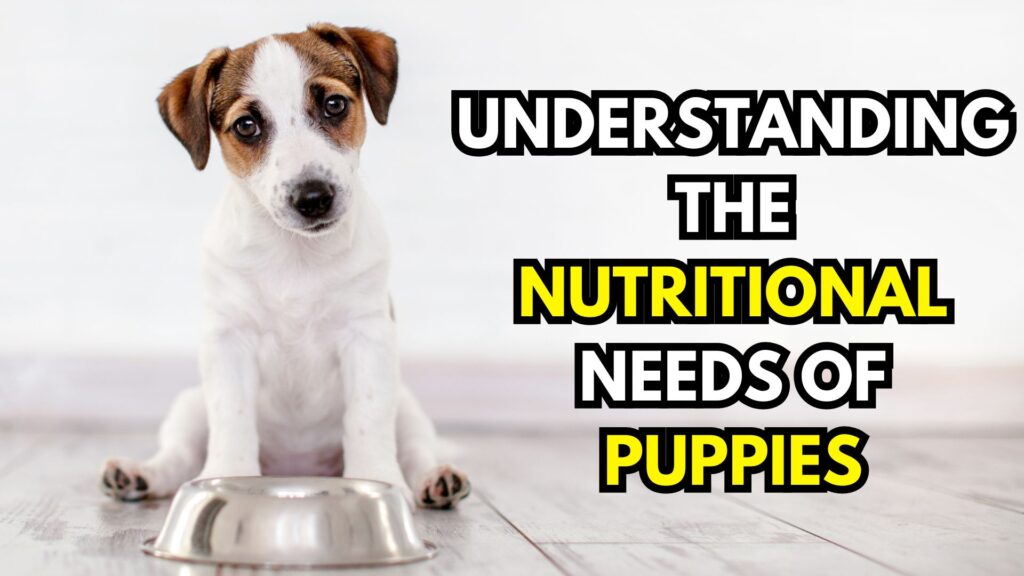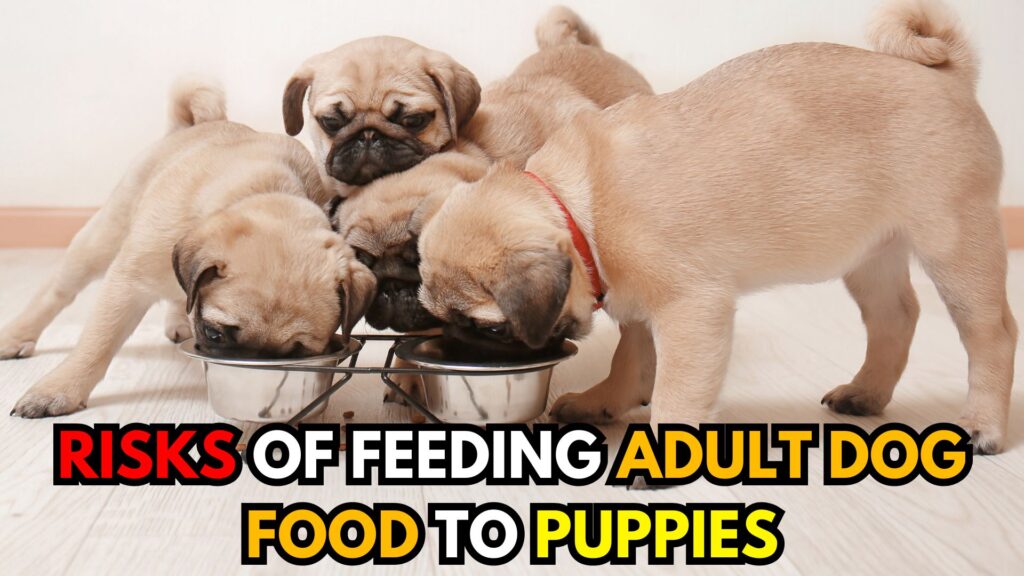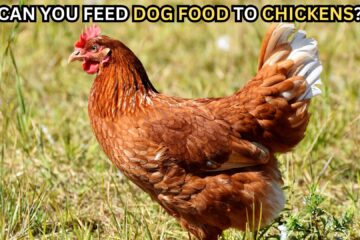As a devoted pet parent, ensuring the optimal health and wellbeing of your furry friend is always a top priority. This commitment often leads to a crucial question many puppy owners face: “Can puppies eat adult dog food?”
Understanding the dietary needs of puppies is essential, as their growing bodies and developing systems require specific nutrition different from adult dogs.
In this comprehensive guide, we delve into the risks, benefits, side effects, and warnings associated with feeding puppies adult dog food, providing you with the knowledge you need to make the best decisions for your puppy’s health and happiness.

Can Puppies Eat Adult Dog Food?
To answer the question straightforwardly: it is generally not recommended to feed puppies adult dog food.
This is because puppies have unique nutritional needs that are different from those of adult dogs, including higher protein, fat, and calorie content to support their rapid growth and development.
Adult dog food typically lacks these essential components in the necessary amounts, which can lead to nutritional imbalances and health issues in puppies.
Nutritional Needs of Puppies

Puppies have specific nutritional requirements that differ from adult dogs. Key nutrients for puppies include:
- Protein: Essential for tissue building and growth, puppies need more dietary protein and essential amino acids than adult dogs.
- Fats: Serving as a concentrated calorie source, fats, especially essential fatty acids like Omega-3 and Omega-6, are crucial for puppies’ skin and coat health, brain development, and overall growth.
- Calcium: Important for strong bones and teeth, calcium requirements vary depending on the puppy’s breed size.
- Carbohydrates: They provide energy and fiber, aiding in puppies’ digestive health.
- DHA: An omega-3 fatty acid, DHA is important for brain and vision development in puppies, often sourced from fish oil.
Comparing Puppy Food and Adult Dog Food
Puppy food is specifically formulated to meet the heightened nutritional needs of growing puppies. It generally contains more calories, proteins, fats, and essential nutrients compared to adult dog food.
Adult dog food, on the other hand, is tailored to maintain the health and well-being of adult dogs, often lacking the necessary nutrient concentrations required for the rapid growth and development of puppies.
The Risks and Precautions of Feeding Puppies Adult Dog Food

Feeding puppies adult dog food can lead to various health issues. Some of the risks include:
- Stunted Growth and Bone Problems: Puppies fed adult dog food may experience stunted growth and developmental issues with their bones and joints due to nutritional imbalances.
- Digestive Discomfort: Puppies have sensitive digestive systems that might not tolerate the ingredients and nutrient levels in adult dog food.
- Long-term Health Consequences: Feeding adult dog food to puppies can result in long-term health issues due to nutritional deficiencies.
To avoid these risks, it is essential to:
Before making any dietary changes for your puppy, consulting a veterinarian is crucial. They can provide advice tailored to your puppy’s specific needs and health status.
Alternatives and Transitioning
When choosing food for your puppy, consider:
- High-Quality Puppy Food: Opt for puppy food that meets the Association of American Feed Control Officials (AAFCO) standards.
- Homemade Diets: Only consider homemade diets under the guidance of a veterinary nutritionist to ensure balanced nutrition.
Transitioning to Adult Dog Food
Puppies typically transition to adult dog food around 12 to 18 months of age, depending on their breed and size. This transition should be:
- Gradual: Mix increasing amounts of adult food with decreasing amounts of puppy food over 7 to 10 days.
- Monitored Closely: Pay attention to your puppy’s response to the new diet and adjust as needed.
How Much to Feed Your Puppy?

Determining the right amount of food for your puppy is essential to avoid overfeeding, which can cause rapid growth and related health problems.
Generally, puppies at 8-12 weeks consume about twice the calories of an adult dog of similar weight. However, overfeeding can lead to obesity and skeletal issues, especially in large breeds.
By understanding these nutritional needs and the differences between puppy and adult dog food, you can ensure your puppy receives the best possible diet for healthy growth and development.
Conclusion
In conclusion, while the temptation to simplify mealtime by feeding puppies adult dog food might exist, it’s clear that doing so can compromise their health and development. Puppies thrive on diets specifically formulated to meet their unique nutritional needs.
By choosing the right food and following expert advice, you can ensure your puppy grows into a healthy, happy adult dog.
Remember, when in doubt, always consult with your veterinarian to provide the best care for your beloved pet.



0 Comments